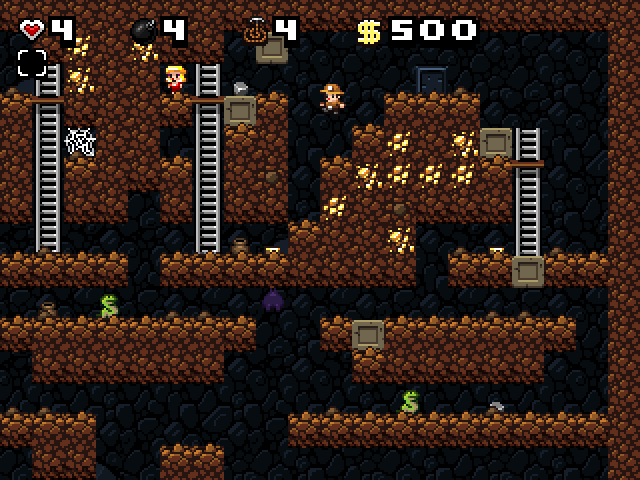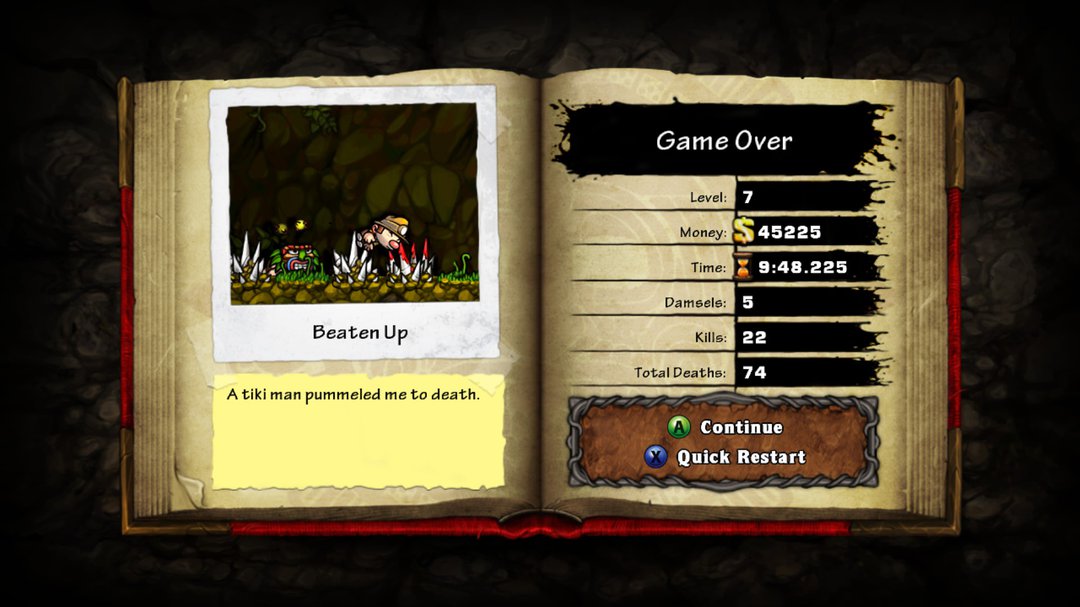Spelunky by Derek Yu
Publisher: Boss Fight Books
Price: $4.95 (eBook), $14.95 (Paperback), $17.95 (Bundle)
Copy provided by publisher
March 29, 2016
It’s hard to overstate just how important Spelunky has been in shaping games as we know them today. Drawing influence from classics like Super Mario Bros. and The Legend of Zelda as well as roguelikes like NetHack and Dwarf Fortress, Derek Yu created a game that was heavily responsible for influencing a huge wave of roguelikes for years to come.
Boss Fight Books’ latest release tells us the story of Spelunky, spanning from the game’s origins as a freeware title on TIGSource all the way to its eventual release on Steam. Written by Yu himself, this book is a wonderful look into the mind of a creator and the reasoning behind his design decisions. If you’re at all interested in reading about what it takes to design and create a game, this book is a must-read.

The game has come a long way since Spelunky Classic, which is definitely worth revisiting after reading the book.
Part history lesson, part game design crash-course, the book goes into a satisfying amount of detail about every step of Spelunky’s evolution from prototype to finished product; Derek Yu does a fantastic job of interweaving the story of the game’s creation with small essays on game design. Yu’s writing style is friendly and inviting, something you might be used to if you’re familiar with his blog. His pacing is excellent. Each topic flows into the next seamlessly, helping you feel like you’re retracing the train of thought that led to each step of Spelunky’s development. It feels like a privilege to get such detailed descriptions of how the game works, backed up by the decisions and philosophies that made them that way. Sections about the game’s history blend seamlessly into explanations of specific mechanics, which are then backed up by at-length discussions of Derek’s beliefs about good game design.
One of the highlights of this book for me is finally getting a glimpse at how Spelunky’s programming works. While this definitely not a book about programming, it’s great to get a layman’s explanation of the game’s random level generation, or the logistics of remaking a Game Maker game so that it can be published on Xbox Live Arcade. We also get some intriguing trivia, like the fact that Jonathan Blow initially offered to let Yu build the XBLA version of the game off of the source code for Braid. Even then, we learn the valuable lesson that it’s not always easy to decipher someone else’s code: Yu and lead programmer Andy Hull eventually chose to build the game from scratch themselves.
As intriguing as the technical aspects are, what kept me compelled is the way Yu describes his design decisions. Vital design topics are discussed, from simpler problems like how to approach player feedback, as well as much more complex problems like making your game appeal to new players and experts without cheapening the experience for either player. We even get to see the origins of good ideas that were eventually scrapped somewhere down the line; some simply due to time constraints, some due to design. Regardless, it’s great to see that the road to what many people consider a perfect game had many bumps along the way.

Even simple UI elements like the adventurer's journal had a ton of thought put into them.
The image of puzzle pieces is brought up often in this book. Initially, it is a way to describe how Yu fit the right pieces together to create Spelunky Classic, but eventually as the idea that everything is a piece of a larger puzzle we’re all working on. Without the visual imagery of Raiders of the Lost Ark, it’s hard to imagine Spelunky would be the same at all. Likewise, if Spelunky was never made, we might have never gotten games like The Binding of Isaac or FTL. The Let’s Play community might not be the same had Spelunky not popularized the idea of the Daily Challenge. Because of this, Yu emphasizes how vital it is to build the skill of finishing your projects. He reiterates many of the points he made on his blog in the midst of working on Spelunky in 2009, but his message rings so much louder in the context of having finished the game.
It’s clear that things would be very different today had Spelunky not been released. What’s more important about this book, however, is the idea that everyone making games right now has that same opportunity. By releasing his game, Derek Yu opened a door of opportunity not only for himself, but the entire gaming community. By releasing this book, I’d like to think Yu is teaching us to do the same - whether it’s a game or not.
The book can be purchased directly from Boss Fight Books here . If it isn’t clear already, I highly recommend it.
Like our reviews? Like our Facebook page or follow our Twitter to get first word when we publish new articles!